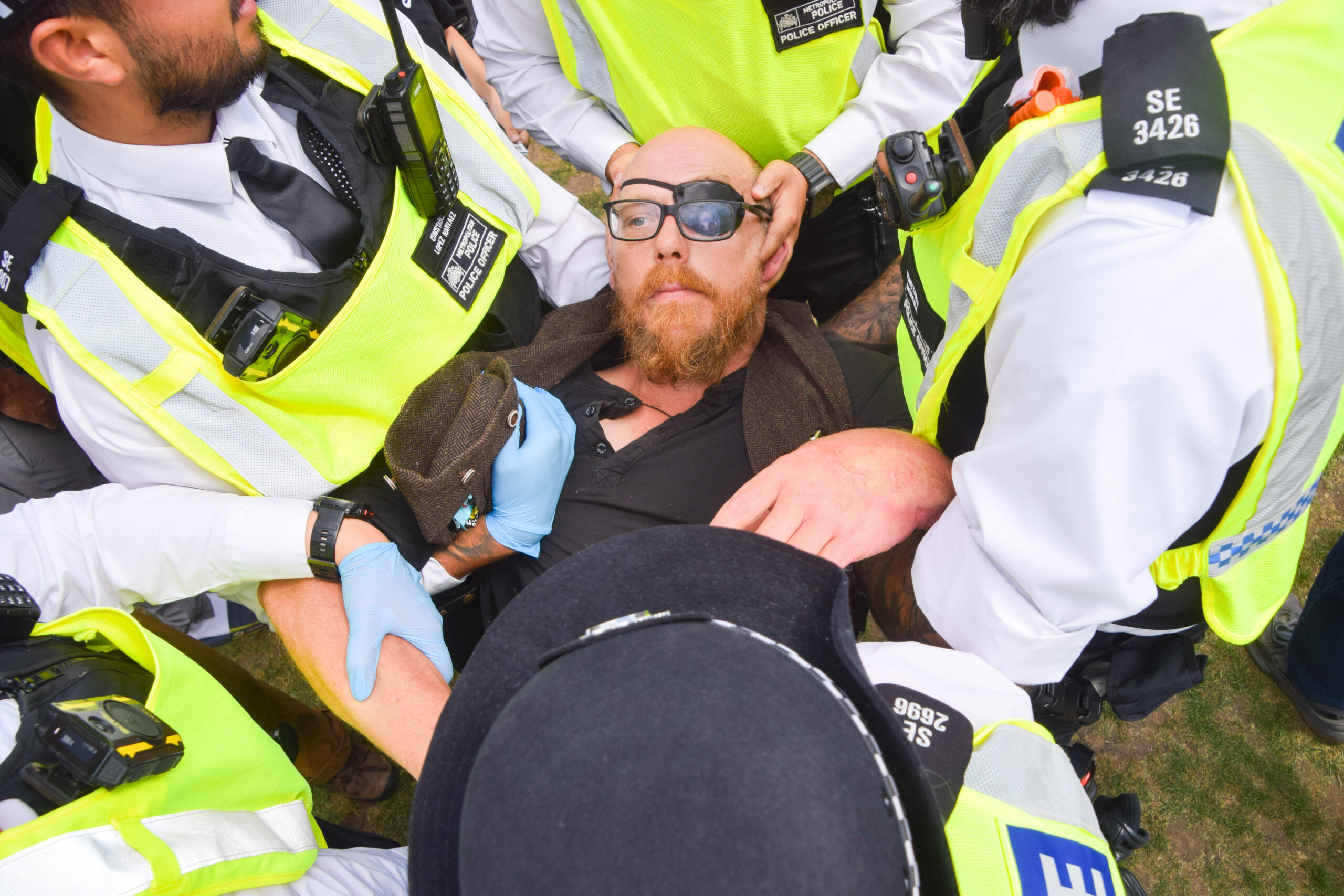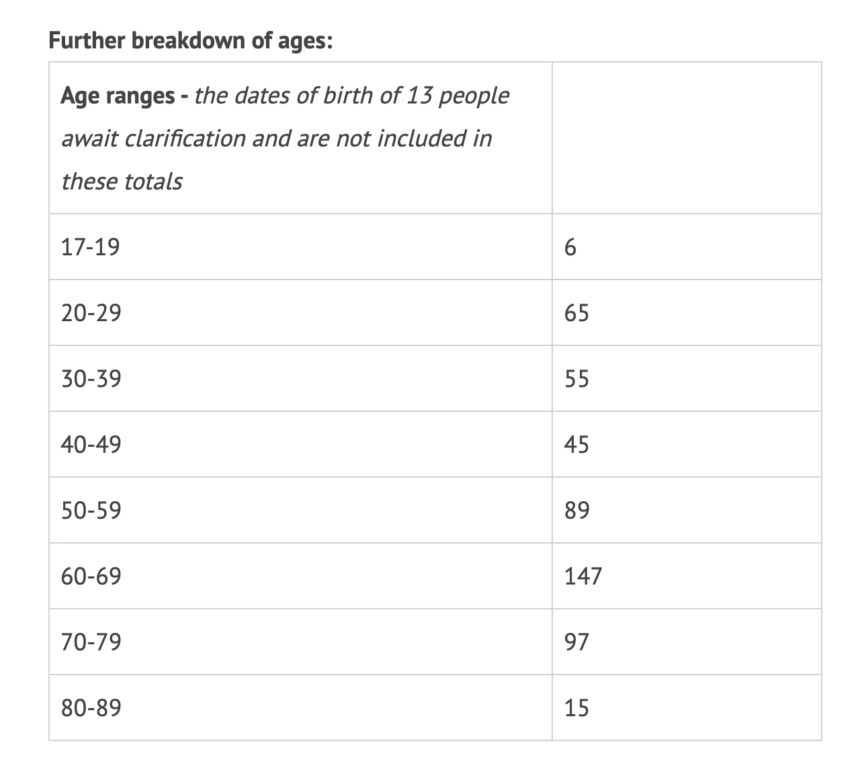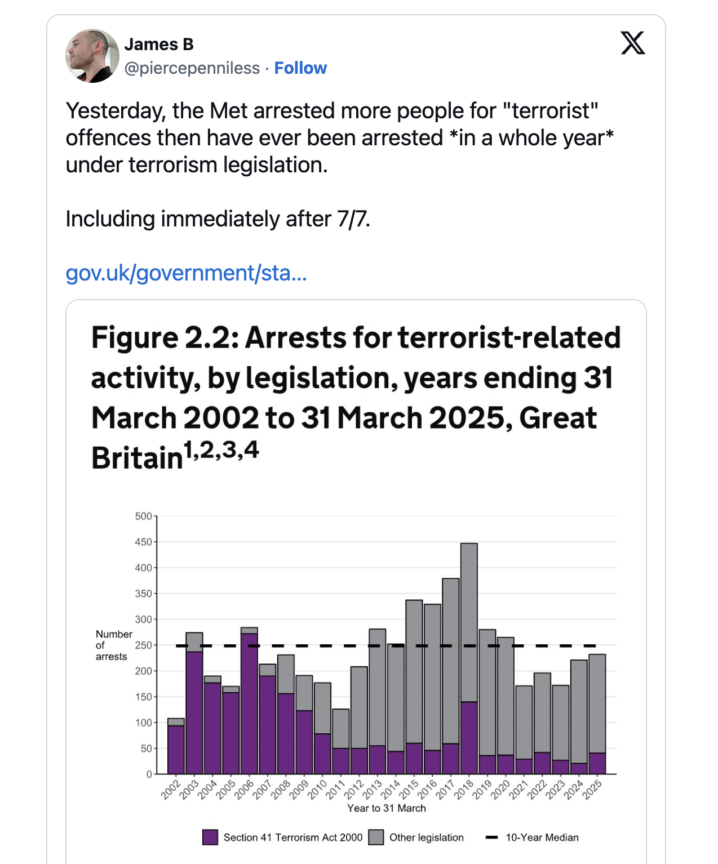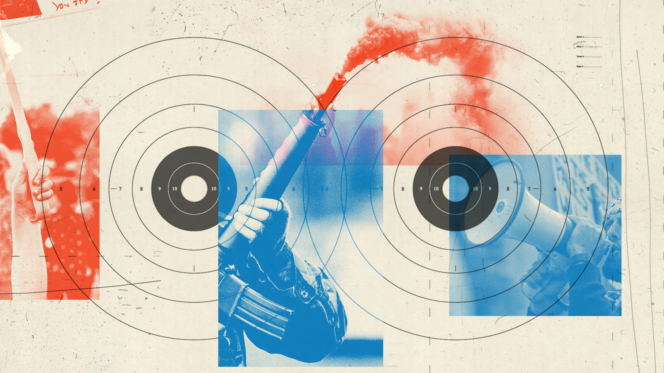What Actually Happened When Hundreds Defied the Palestine Action Ban?
Even the police said it was ‘carnage’.
by Charlotte England
11 August 2025

Saturday’s mass action in Parliament Square saw the greatest number of arrests by London’s Met police at any single event since 1961 – but it also forced officers to admit they couldn’t cope.
Rights groups have condemned the state’s response to the peaceful protest as “deeply concerning” amid images of elderly and disabled people being carried away by dozens of cops.
In total, 522 people were arrested under Section 13 of the Terrorism Act for “displaying an item (in this case a placard) in support of a proscribed organisation (in this case Palestine Action)”, and ten others for offences including assaulting a police officer.
But organisers Defend Our Juries suggest it’s both a story of state overreach and of police weakness, with hundreds more having walked away after successfully sitting for an hour with signs that read “I oppose genocide. I support Palestine Action”. The group has described it as a “major embarrassment to [home secretary] Yvette Cooper” and the Met police.
So how did it play out? Novara Media was on the ground all day. Here’s what really happened.
How many people took part?
It’s impossible to tell for certain if there were more than 1,000 people holding placards, as Defend Our Juries claims.
However, having attempted to count and estimate several times throughout the day, we don’t think this number is unrealistic. It’s safe to say there were at least several hundred more holding placards at 1pm than the 522 arrested.
The Met has also been unreliable with numbers. The police initially said in a statement on Saturday that Defend Our Juries’ claim that they only arrested “a fraction” of those present “simply isn’t true”, insisting that there were only “around 500 to 600 people in Parliament Square when the protest began, but many were onlookers, or people not holding placards”. Taking into account that videos show hundreds of supporters, press and passersby in the square, this is clearly inconsistent with the final number of arrests.
How many people were arrested?
522 placard-holders were arrested under Section 13 of the Terrorism Act 2000 for “displaying an item (in this case a placard) in support of a proscribed organisation (in this case Palestine Action)”, and ten others for offences including assaulting a police officer.
The average age of those arrested was 54, according to police figures, and the largest age group was 60-69. Nearly 100 arrestees were in their 70s, and at least 15 were over 80.

Over the course of the day, the Met arrested the most people at any single event since 1961 – overtaking a poll tax protest in 1990 that saw 339 arrested, and an Extinction Rebellion demonstration in 2019 where 306 people were detained.
In 1961, two Committee of 100 protests against nuclear weapons resulted in a greater number of arrests – more than 800 and 1,314 in Parliament Square and Trafalgar Square, respectively.
This means more people were arrested for terrorist offences in just a day than have ever previously been arrested under terror legislation in an entire year in the UK.

Were the police able to enforce the ban?
Last week the Met said it was “experienced in dealing with large-scale protests” and insisted officers would arrest anybody who took part in the action. A spokesperson doubled down on this message on Saturday afternoon, saying “we are confident” that anybody who came to Parliament Square with a placard “was either arrested or is in the process of being arrested”.
It is certainly true that an enormous number of arrests were made. Yet organisers have repeatedly pointed out that police were unable to arrest everyone who took part in the action.
After an hour, only around 50 arrests had been made, removing less than 10% of the protest, even by the Met’s own count. Up to half of those who took part may then have left of their own accord, after sitting for more than 60 minutes with their signs.
It frequently seemed that police were out of their depth, with one officer, who had been bussed in from Wales to support the Met, describing the situation as “carnage”.
On Sunday, a Met police spokesperson seemed to admit defeat, rowing back from their original line and saying the force faced “entirely unrealistic” challenges.
So, what actually happened?
At 1pm, up to 1,000 people (as mentioned, it is impossible to verify this number) who had gathered quietly on the grass in Parliament Square wrote “I oppose genocide. I support Palestine Action” on cardboard signs.
Past Defend Our Juries actions have lasted for one hour. Anybody not arrested after sitting in quiet contemplation for 60 minutes has claimed victory, saying it proves the law is unenforceable.
During the first hour of action, police made arrests at the fringes of the action, but met heavy resistance from angry protesters, with fights breaking out. As a result, officers mostly hung back, forming a line around the edge of the square. One police officer, who had been bussed in from Wales to bolster Met numbers, described the situation as “carnage”.
In total, around 50 arrests were made in this time. That’s likely around 5%, and certainly below 10%, of the total number who took part.
When Big Ben struck 2pm, the hour of quiet contemplation ended. People got up and cheered. Many dropped their signs and left.
People who took part have confirmed they were able to leave soon after 2pm. One 86-year-old protester said they left Parliament Square at 2.20pm, unarrested, and with many others, after holding their sign for over an hour. They said: “I have taken part in many political demonstrations over the last 70 years, but I cannot think of anything comparable to today, both in its social and political importance for Britain, or in terms of the human price being paid for government complicity in genocide.”
However, hundreds of people who had come expecting to be arrested decided to stay put and wait for this to happen.
Arrests were made one at a time, very slowly. It took the police more than seven hours from the start of the protest to have arrested everyone who chose to stay, with the final protester taken away at about 8pm.
What happened to the people arrested?
Over 300 were processed nearby in the street and released on bail to appear at a police station at a later date. Their bail terms ban them from attending future Palestine Action protests. Some immediately returned to Parliament Square, regardless.
Around 200 people who refused to give their details were taken to police stations instead, as were 30 people who were already on bail, having been arrested at previous actions.
Nobody has been charged, but the Met says it is going to put together case files to send to the Crown Prosecution Service (CPS).
So far, only three people have been charged for taking part in previous actions, with 26 more files sent to the CPS, the Met has said.
What now?
Before the protest, Huda Ammori, co-founder of Palestine Action, said it would “go down in our country’s history as a momentous act of collective defiance of an unprecedented attack on our fundamental freedoms”. It seems she was right, with the action and the sheer number of arrests making headline news.
Amnesty International has led the charge in describing the arrests as “deeply concerning”. Public outrage seems to be growing by the day, as the ban appears increasingly untenable.
In November, a judicial review will decide whether or not to reverse the ban. If the proscription is found to be unlawful, it is unclear if any arrests made under it will also be deemed unlawful, with Amnesty suggesting this could be the case.
Defend Our Juries is now planning another mass action for September.
Charlotte England is a director and deputy head of articles at Novara Media.


